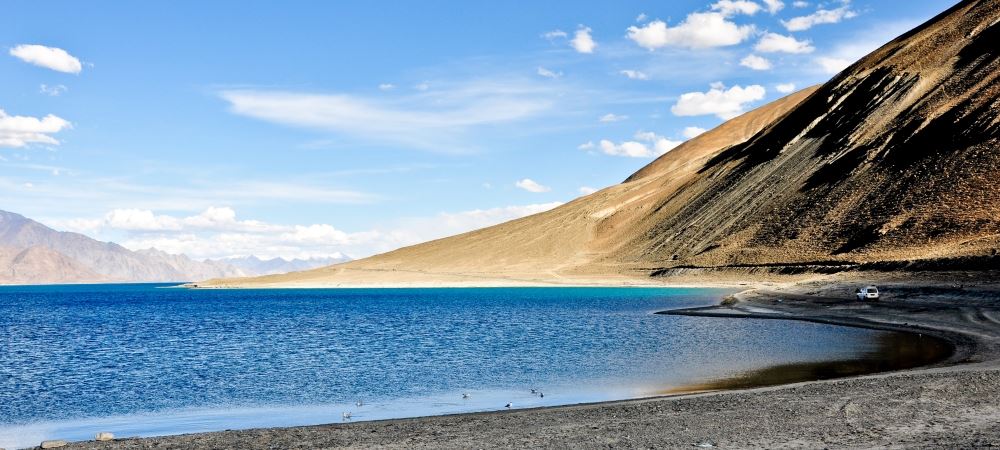Pangong Lake, also called Pangong Tso is one of the most famous and stunning spots in Ladakh. Spread across the high Himalayas at an altitude of about 13,860 feet (4,225 meters), the lake stretches over 134 kilometers with around one-third in India and the rest in Tibet (China).
What makes Pangong truly special is its changing colors. From deep blue to light green and even shades of purple, depending on the time of day and sunlight. It’s not just a lake, it’s a living painting in the middle of the mountains.

📽️ From History to the Big Screen
Pangong was once part of the ancient caravan routes between Ladakh and Central Asia. Today, it’s a symbol of Ladakh’s beauty and peace. It is a strategic point near the India – China border.
Many travelers first heard of it through Bollywood. Pangong gained massive fame after being featured in the movie 3 Idiots. Since then, it has become a must-visit destination in every Ladakh itinerary.
📍 What You Can Do at Pangong
- Relax by the shore
Sit in silence and enjoy the peaceful sounds of the wind and water. It’s perfect for reflection or simply soaking in nature. - Watch the sky change
The lake reflects the sky beautifully. Sunrise and sunset here are unforgettable. - Photography heaven
With mountains, clouds and light playing off the water, every photo looks like a postcard. - Visit local villages
Stop at Spangmik, Man or Merak villages to learn about life near the lake and stay with local families.
🧭 Why Visit Pangong Lake?
- ✅ One of the most beautiful high-altitude lakes in the world
- ✅ Famous for its color-changing waters and peaceful vibe
- ✅ Easy to reach from Leh via Chang La Pass
- ✅ Great for camping, photography and stargazing
- ✅ Surrounded by mountains and silence. No cities, no distractions.
🗓️ Travel Info
Altitude: ~13,860 ft / 4,225 m
- Distance from Leh: ~160 km (5–6 hours by road)
- Best Time to Visit: May to September (lake is frozen in winter)
- Permits Required: Yes (Inner Line Permit for Indian citizens; Protected Area Permit for foreigners)
- Stay Options: Tent camps, eco-resorts and homestays (Spangmik, Merak, Man)
- Mobile Network: No coverage. Some satellite WiFi in camps
🗣️ Traveler’s Tip:
“Bring warm clothes even in summer. Nights near Pangong are freezing. Don’t rush. Stay a night to enjoy sunrise, sunset and stars like never before.“
More About Pangong Lake
The lake also changes its color. During the day it is usually blue in color when the sun is high, turquoise color on its banks, and deeper blue at the middle. As the sun moves, it continues to change the color and losing its shades turning duller.
In the lake you will never find fish or other aquatic animals or plants. The lake has never supported life although it has some micro vegetations and small crustaceans.
The place is also a habitat for many ducks and gulls. Additionally, the lake is a breeding ground for almost all the local and the migratory birds. The birds and ducks create good scenery around the lake which is highly admired by tourists.
Tourist like the area due to the large population of Brahmin ducks and bareheaded goose not found in many parts. Some tourists at times are usually lucky to spot some wild animals like kiang which is a wild ass and a brownish rodent of the squirrel family called marmot. The marmot likes to live within burrows around the lake but may also live on the surface.